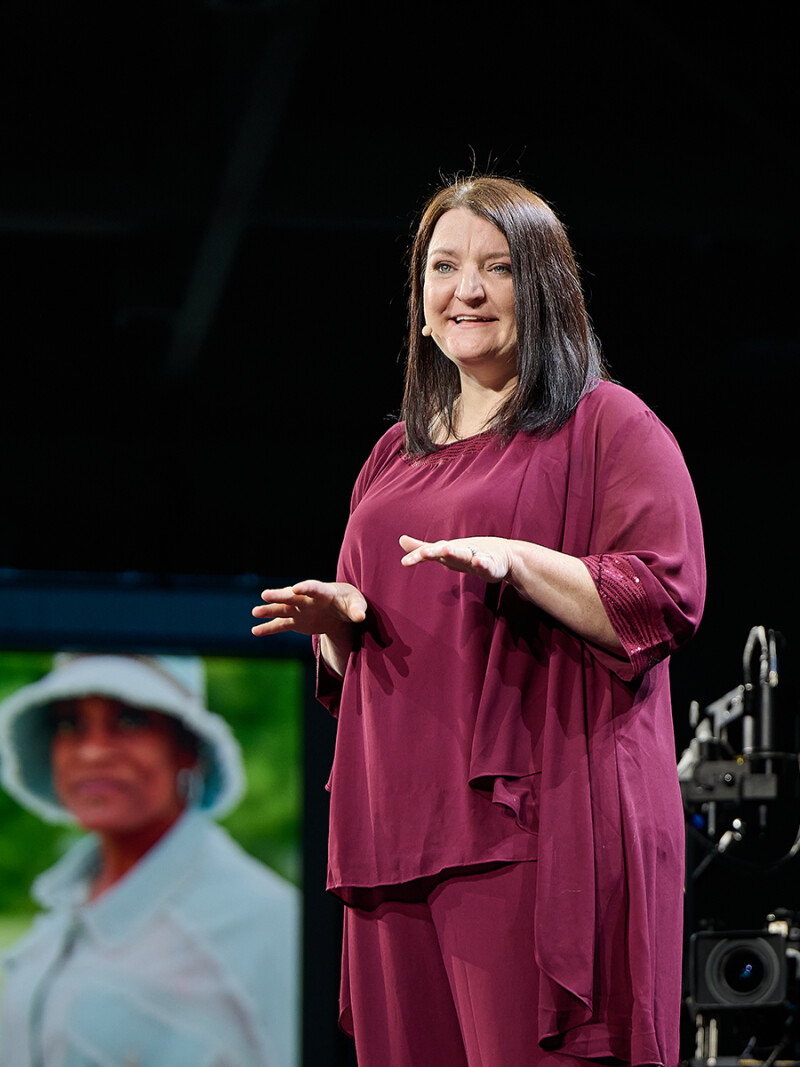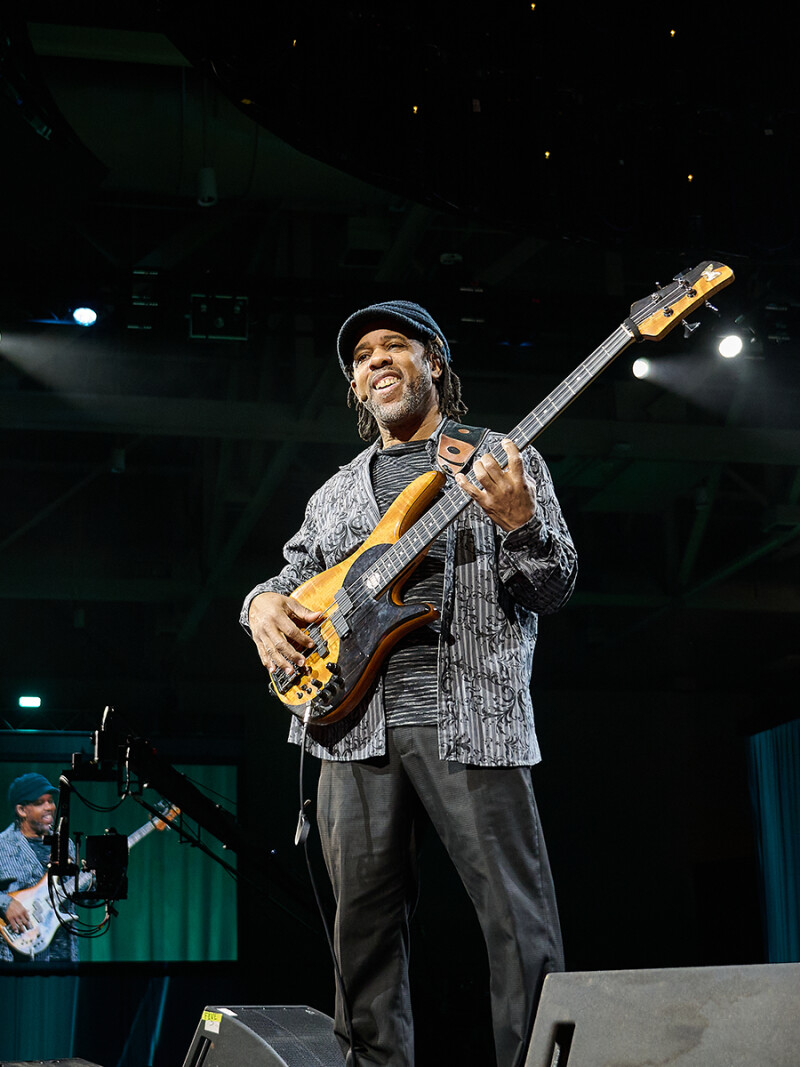Our ancestors have a story to tell, and we are strengthened by knowing those stories. This is the message shared in this year’s RootsTech 2025 Impact Forum. Read more about stories that have impacted generations, including a great-grandmother who shared her Native American heritage, an enslaved woman who sued for her freedom, and a boy hiding in a chimney whose life was spared. You can also watch a full recording of the forum presentations.
Mylo Fowler—Connecting with Our Elders
Known for his award-winning adventure photography, Mylo Fowler is passionate about sharing stories rooted in his Navajo culture. From enduring blizzards to swimming with sharks, Mylo finds exhilaration in capturing beautiful moments in nature. Each of his photographs tells a story.

Mylo was raised in Arizona surrounded by his family and his Navajo clan. In his presentation, he shared the influence his great-grandmother’s teachings and stories have had on him. She taught him about horses, measuring time by the seasons, and the importance of treating all elders in their clan with respect. Living amidst breathtaking natural scenery, Mylo expressed how Navajo stories have helped him learn from the grandeur of the land around him.
“I believe you are somebody else’s medicine,” Mylo said to the audience. Among the stories he shared, Mylo recalled that his great-grandmother grew up without access to hospitals. She taught him how to mix plants and use natural remedies to treat illness. Nature was her medicine. More than that, she taught him a deeper truth: we are each other's medicine.
Although his grandparents and great-grandmother have moved on to “the world of great spirits,” Mylo continues to learn more by connecting with the living elders in the Navajo community. “They are the wise ones. They are the knowledge keepers,” Mylo said. “They are the doorway from my generation to the previous ones that they’ve known about. … They always have some amazing wisdom and light to share.”
One piece of wisdom from Mylo’s elders that has stuck with him since he was young is that “we all carry a certain amount of light.” Mylo commented, “Some days it’s brighter, and other days, it’s a flicker. Nonetheless, that light we have is something beautiful, and the goal is to share that with others.” This light can impact others when they are in need of help and encouragement.
Have you recorded the stories and wisdom of your elder family members? Consider doing family interviews and recording and saving the interviews with the FamilySearch Memories app.
Lindsay Fulton—Recovering Lost History
In 2023, American Ancestors began a tremendous project called “10 Million Names.” This project is to identify 10 million people who were enslaved in the pre- and post-colonial United States. Lindsay Fulton, chief research officer of American Ancestors, shared a new project to identify descendants of these 10 million people.
So far, nearly 1 million people have been identified. This is an effort to recover the lost history of many people of African American descent. In her forum presentation, Lindsay shared video clips of several interviews with those who were introduced to their ancestors for the first time.

In an especially touching story, Lindsay shared extensive research that linked Elizabeth Freeman, born about 1744, to a living descendant. At age 7, Elizabeth was given as a wedding gift to Colonel John Ashley and his wife. In 1781, Freeman sued for her freedom in Massachusetts and won. Her case eventually led to the abolition of slavery in all of Massachusetts.
Over many years, family history researchers had attempted to bring Elizabeth Freeman’s family tree through to the 21st century, but they kept hitting a brick wall. Recently, that brick wall fell with the discovery of a living direct descendant named Lisa Shepperson.
In a video clip Lindsay shared, Lisa expressed her enthusiasm and emotion as she received the news that she was the first identified living descendant of Elizabeth Freeman. “I’m excited, and I’m grateful,” she said.
Lisa had the opportunity to learn more about Freeman as she visited sites in Massachusetts connected to her history. “One stop was the Ashley house. ... There, Lisa walked through the same rooms where her ancestor had been enslaved. She stood over the same floorboards, saw where Elizabeth likely tended the fire, cared for the Ashley children, and overheard discussions about natural rights. Lisa even stood over the bed where Elizabeth may have dreamed of her freedom.” She also visited the field where Elizabeth had purchased her own house, as well as Elizabeth’s gravesite, where Lisa left a bracelet her niece had made as a tribute.
Victor Wooten—Knowing Who You Are
“Who are you?” That was the opening question posed by 5-time Grammy award-winning bass player Victor Wooten asked as he began his presentation at the Impact Forum. Many might be inclined to respond with their profession—“I’m a doctor,” “I’m a teacher,” “I’m a bass player”—but Victor shared a deeper lesson he learned from his parents: you are not defined by what you do.
Strumming his bass as he spoke, Victor shared several lessons from his parents that helped him understand his identity and the importance of self-worth. From his mom, he learned a simple yet profound truth: “When I wake up and look in the mirror every morning, I’ve already met the most important person I’m going to meet today.” How we see ourselves is vitally important.

Victor recalled one night when many relatives were visiting their home. He and his brothers had given up their beds for others to sleep in because their house was small. That same night, Victor and his brothers had performed a big show at a coliseum. Their mother was agitated because her friends criticized her for not attending the show to support her boys. She responded, “I’m not impressed that my boys played at the coliseum. I’m impressed that my boys can play at the coliseum and come home and sleep on the floor.”
Victor also shared a story from his father’s youth—one that left a lasting impression. As a young man, his father was chased by members of the Ku Klux Klan. Desperate to escape, his father ran into a house and hid in the chimney. One of the men chasing him came in and saw the frightened young man hiding there. Another man came in the house and yelled, “Is there anybody in here?” “No,” the first man responded, choosing to spare the life of Wooten’s father.
“Dad had a choice at that moment,” Victor shared. In that pivotal moment, his father could have chosen to be like the men who wanted to kill him. But instead, he chose to be like the man who spared his life. That decision—and the one that spared his life—left a lasting impact: it not only allowed Victor to be born, but it also helped shape who Victor chose to become.
Victor hopes to leave his own children and grandchildren with stories—good seeds that will stick with them and give them strong roots that will help them grow. He left the audience with an invitation: “We are at the end of our family tree, and we are here because of good people before us. So let’s do good things with it.”
The RootsTech 2025 Impact Forum highlighted many examples of how family stories can shape future generations. You can use the free Memories tools on FamilySearch.org, such as Record My Story, to record and preserve your family stories. Sharing these experiences with each other as a family can boost self-confidence and inspire the mind, leaving a lasting impact on those living today while preserving meaningful memories of those who came before.



